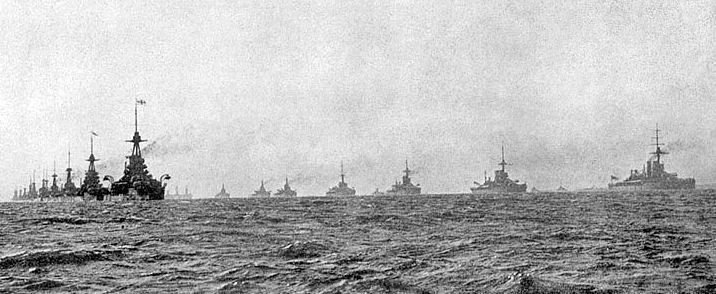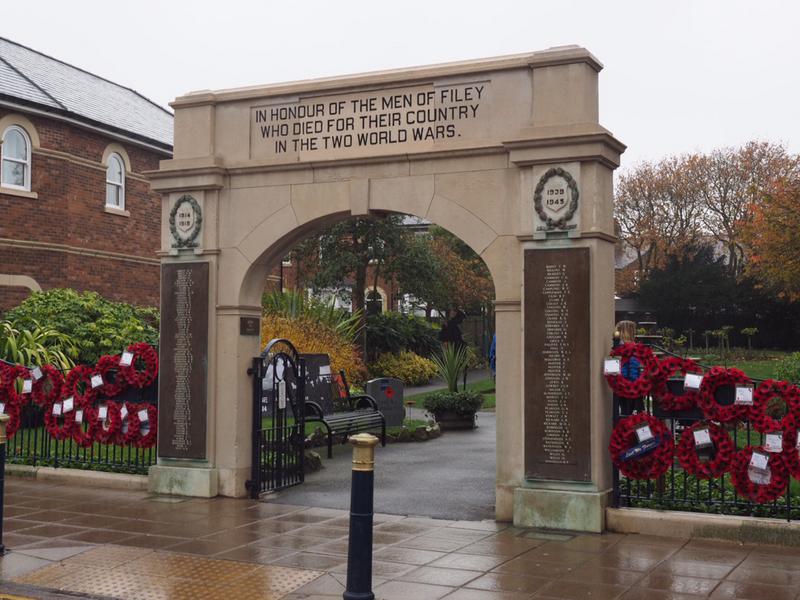Jun-2020
Distant Guns, Filey and the first month of the Great War
As we flick page through the pages of history, it is tempting to ascribe certain years as the end of one chapter and, therefore, the beginning of another. There is no more alluring target than the year 1914. Philip Larkin lamented that there would ‘never such innocence again’ in his poem MCMXIV. It has a strong seductive appeal, we are invited to mourn for a lost world, one whose simplicity and order was shattered in the maelstrom of the Great War.
Yet Larkin wrote the poem in 1964 and he himself did not live through the times whose loss he so powerfully evoked. It is an understandable urge, the war was fought with such savagery and loss that the years preceding it were bound to be looked back on with a fondness that arguably did not reflect the reality. In the years leading up to 1914 the suffragette campaigner Emily Davidson died beneath the hooves of the King’s horse during the Derby, the Titanic sank with an horrendous loss of life and the fight for Irish independence dominated politics. It can be more successfully argued that the Great War accelerated societal change rather than created it.
Apparently the summer of 1914 was blessed with wonderful weather. However, Filey was not insulated from events on the continent. Newspapers covered the rising tensions. In July the Royal Navy’s Grand Fleet, the world’s most powerful fleet comprising of thirty-two battleships and battlecruisers, sailed to its war station at Scapa Flow in the Orkney Islands. What a sight, and reassurance, it must have been to holiday making Britons.

The Grand Fleet at sea 1914
In the week running up to the declaration of war there was an exodus of visitors from Filey. It was reported to be in response to a financial crisis caused by the closing of the London Stock Exchange and the calling up of officers for military service. However, trains arriving for a weekend in early August were reported to be crowded, with ordinary visitors and Boy Scouts from Sheffield. The latter comprised of 115 boys, with detachments from the Sheffield Boys’ Working Homes, the Crookes Orphan Home and two Boy Scouts companies from Horncastle and York, on a pre-planned camping trip to Primrose Valley. On the sporting front, golf and lawn tennis tournaments went ahead and it was said that ‘capital sea fishing’ was enjoyed by visitors.
As the Boy Scouts enjoyed the fresh air of Primrose Valley the crisis deepened, in the famous words of the British Foreign Secretary Sir Edward Grey, ‘The lamps are going out all over Europe; we shall not see them lit again in our lifetime’. On Sunday 2 August the Germans occupied Luxembourg and the following day invaded Belgium. The dominoes were falling, as Britain, as a guarantor of Belgian neutrality, declared war on Germany as a result.
The Admiralty ordered all fishing fleets to return to port with immediate effect. This proved to be a logistical headache at Hull, whose docks were not designed to accommodate the entire fishing fleet at the same time. Whilst plans were being put in place, several trawler fleets were instructed to lie up for a few days. The entire Hellyer trawling fleet, some thirty-six steam trawlers, anchored in the lee of Bempton cliffs. The toll that the war was to take on that proud fleet was a stiff one, as twenty-two of Hellyer’s vessels were lost to enemy action.
Four days later, on Saturday 8 August the Filey ‘Terriers’, recruits of the 5th (Territorial) Battalion Yorkshire Regiment (better known as the Green Howards), passed through the town en route to Hull to join their Battalion. The Filey contingent of the Yorkshire Regiment, consisted of Lieutenant Harold Brown, Corporal. F. Watkinson, and Private’s J. H. Coilings, H. Pincott, J. Pashby, J. V. Townsend, W. Taylor, W. Hill, and J. Burd. By the time the unit left for France in 1915 there were at least thirteen Filey men in D Company, and it was popularly known as the ‘Filey Company’. Harold Brown would become a Major and would be awarded the Distinguished Service Order (DSO), Military Cross and Bar (MC) and the Croix de Guerre. Unfortunately he was killed in action on 23 March 1918.
Ex- Colour-Sergeant Chapman, of the Yorkshire Regiment, the caretaker and steward of the Constitutional Club, was ordered to be ready for duty moment’s notice. P.C. Huntley, a Filey constable, a reservist who had already been called up, was promoted to sergeant in the Royal Scots Guards.
The private wireless installation on the Flat Cliffs south of Filey was dismantled in accordance with an order to that effect. At Gristhorpe a meeting was held in the Church Infants School, with the vicar presiding. In response to an appeal by Captain Riddell, of Gristhorpe Hall, a vigilance committee was formed, the duties of which were to make arrangements in the event of a crisis, (including the removal to a place of safety of the women and children of the village); to take an inventory of the food supplies of the district; and to assist the patrolling and watching of the coast. Despite the growing war clouds, the crowds still came to the coast. The Midland Railway were offering full and halfday ‘Cook’s Excursions’ to Filey from Sheffield for 19 and 20 August. It seems astonishing now that within a couple of days of those day trips, the British Army would fire its first shots of the war at the Battle of Mons on 22 August.
The Filey postmaster had occasion to place a notice in the Post Office window that mentioned Germany, he deliberately used a small ‘g’. The joke was apparently well-received and according to a correspondent to the Driffield Times, everyone in the town had taken to using the small ‘g’ when Germany was mentioned in any correspondence. A drawing-room meeting was held at the Vicarage in aid of the Navy Mission. The Rev. G. Richardson of Doncaster acted as representative of the Navy Mission and £1 6s 10d was raised.
By the month’s end the seriousness of the situation appears to have become more apparent. A notice was placed in the Post Office and Police Station windows stating that if a member of the public was stopped by a sentry calling ‘halt’, they must immediately halt and answer ‘friend’ and not move until the sentry is satisfied. Anyone ignoring this order did so at their own peril. On the cliff tops the Chief Constable of the East Riding posted notices stating that: ‘The public are recommended not to approach the cliff top between the hours of 9pm and 6am; also not to show lights in the neighbourhood of the cliffs or shore between those hours, as they are liable to be fired on by military patrols’.
The threat from the German Navy was real, as would be illustrated during the bombardment of Scarborough a few months later, but confidence in the Royal Navy was high. That was reinforced on 28 August when a powerful Royal Navy force swept into seas around the German naval base at Heligoland, sinking three German light cruisers and a destroyer. The news of the victory would have been a great assurance to both locals and holidaymakers alike, that Filey, shielded by the Royal Navy, was safe from seaborne raiders.
Of course, the war would last four long years. Five hundred Filey men would ultimately join the fight on land and sea. Over seventy would pay the ultimate price. Their names are inscribed on the Murray Street War Memorial.

Filey’s War Memorial

comment this post